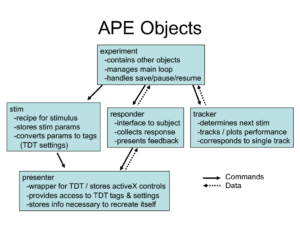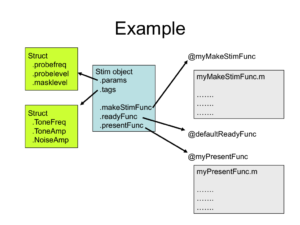APE is a high-level rapid development tool for auditory experiments in MATLAB. Capable and extensible, APE provides easy, flexible control of audio hardware (Tucker-Davis, Dante), adaptive procedures, and more.
Rapid development, limitless customization...
APE uses an abstract approach that distinguishes specific instructions (which can be customized without limit) from code that tells MATLAB where to find them. Default behaviors can be accessed with just a few lines of code but easily customized by changing one or more modular functions.
Flexibly interact with users & experimenters...
Subject responses can be collected via a wide range of hardware and GUI button boxes, touch displays, head trackers, and more. Real-time experiment monitoring is supported by a range of default displays for psychophysical trackers, psychometric functions, etc.
Reliably control multiple audio devices...
APE was designed from the ground up to provide uniform high-level control of audio devices including Tucker-Davis, Dante, PortAudio, etc. The APE presenter object provides a single set of commands to read, write, and play back audio data regardless of hardware type.


APE was designed for perception scientists who use MATLAB to conduct psychophysical studies, particularly studies of hearing (psychoacoustics). APE consists of MATLAB classes which encapsulate common aspects of running perception experiments:
- Parameter and file management
- Stimulus generation
- Psychophysical tracking (i.e. adaptive and constant-stimulus sequences)
- Audio hardware management
- Response collection and user interface
Although APE can drastically reduce the amount of code you write, it does require some familiarity with MATLAB to organize the overall experiment and to replace default behavior with functions specific to your study.
APE is currently available by direct download or by request to request@auditory.space